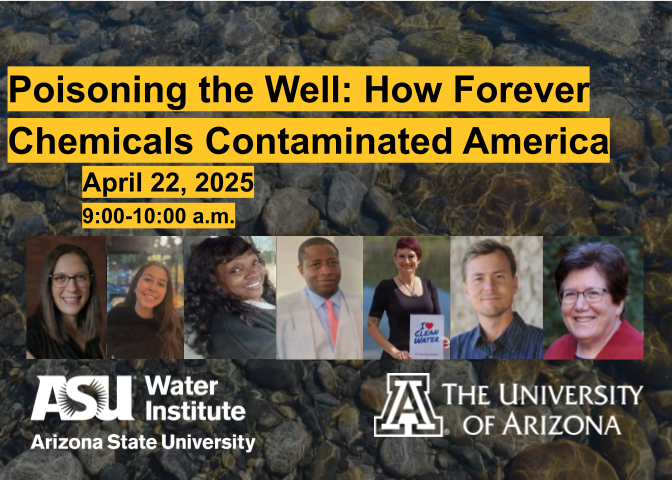Poisoning the Well: How Forever Chemicals Contaminated America

Event description
- Free
- Science
- Sustainability
Los Angeles Times climate reporter Ian James will host a discussion with fellow environmental journalists Sharon Udasin and Rachel Frazin, co-authors of the new book, Poisoning the Well: How Forever Chemicals Contaminated America. They will be joined by book protagonists and activists Brenda Hampton, Mark Favors and Liz Rosenbaum — all of whom took it upon themselves to try to fix a broken regulatory system and seek justice for PFAS pollution in their communities. The panelists will also offer some room for hope, by focusing on the commitment of regular people to engender change and by exploring some of the technologies and political strategies seeking to rectify a national contamination crisis. This event will be held virtually on zoom. Please register for the link. Watch the live stream in person: Walton Center for Planetary Health - Auditorium 107 |
Featuring: Sharon Udasin is an environment reporter and co-author of Poisoning the Well: How Forever Chemicals Contaminated America. Based in Boulder, Colorado, she has been delving into water contamination and conservation issues for 15 years. Sharon was first introduced to the PFAS problem by colleagues in 2019-2020 as a Ted Scripps Fellow in Environmental Journalism at the University of Colorado Boulder. Since completing the fellowship, she has covered US West climate issues for The Hill. A graduate of both the University of Pennsylvania and Columbia Journalism School, Sharon also received a SEAL Environmental Journalism Award in 2023 and has reported for numerous publications throughout her career. | ||
| Rachel Frazin covers energy and environment policy for The Hill and co-author of Poisoning the Well: How Forever Chemicals Contaminated America. At The Hill, she reports on everything from climate change to gasoline prices to toxic chemicals to renewable and fossil energy. It was through this work that she learned about, and became alarmed by, "forever chemicals." She is originally from South Florida, and she studied journalism and political science at (the very cold) Northwestern University. Previously, her work has appeared in the Chicago Sun-Times, The Daily Beast, the Tampa Bay Times, and The Palm Beach Post. | ||
| Brenda Hampton is a humanitarian activist and long-time resident of Lawrence County, Alabama, where she became the driving force behind a 2015 investigation into local PFAS contamination. Brenda's efforts proved vital to securing a settlement with area industry and installing a reverse osmosis system along the Tennessee River in 2021. Passionate about helping neighbors in her town of Courtland and in surrounding communities, Brenda has for years been supplying them with water, food, adult diapers, walkers and other medical necessities. She has also worked nonstop to assist more than 450,000 Lawrence County residents with receiving some form of compensation, including disability, food stamps and healthcare. | ||
| Mark Favors is born and raised in Colorado Springs, Colorado, Mark A. Favors is a U.S. Army veteran and a critical care registered nurse. Currently residing in New York City, Mark serves as co-chair of the Minority Voting Rights Committee of the N.Y. Democratic Lawyers Council, an official voting rights project of both the Democratic National Committee and the N.Y. State Democratic Party. He became a leader in the fight against PFAS pollution after learning that the U.S. Air Force — via Peterson Air Force Base — admitted to dumping the chemicals into Fountain Creek for decades, and that more than 15 family members living in adjacent contaminated areas had been diagnosed with cancer in recent years. He is a member of the Fountain Valley Clean Water Coalition, advocating for safe drinking water and justice for Colorado. | ||
| Liz Rosenbaum is a dedicated clean water advocate and the founder of the Fountain Valley Clean Water Coalition, leading Southern Colorado's fight against PFAS contamination since 2016. She has successfully worked on seven state laws and secured federal funding to protect communities from toxic chemicals. Liz’s relentless advocacy continues to fuel policy changes and public awareness to ensure safe, clean water for all. She also played a key role in bringing the CDC’s health and environmental studies to her community, providing crucial data on PFAS exposure and its impacts. | ||
| Ian James is a water reporter for the Los Angeles Times. He focuses on water and climate change in California and the West and poses questions that produce distinctive stories and contribute to public debates. He deeply examines government decisions and corporate practices to expose problems and injustices, helping to spark changes. His award-winning projects have examined the Colorado River's crisis, overexploitation of water by corporate farms in Arizona, toxic pollution from factories along the U.S.-Mexico border and the consequences of groundwater depletion in farming regions around the world. He is a member of the Society of Environmental Journalists and Investigative Reporters and Editors. | ||
| Sharon B. Megdal is Director of The University of Arizona Water Resources Research Center (WRRC), Professor in the Department of Environmental Science, C.W. & Modene Neely Endowed Professor, and Distinguished Outreach Professor. Her work aims to bridge the academic, practitioner, and civil society communities through water policy and management research, education, and engagement programs. Sharon, who teaches the graduate course Water Policy in Arizona and Semi-arid Regions, has won multiple awards for her contributions to water research and education. Current professional activities include serving on the leadership team for the Water & Tribes Initiative | Colorado River Basin and the Board for the Kasser Joint Institute for Food, Water, and Energy Security, and the Global Council for the Women in Water Diplomacy Network. | ||

